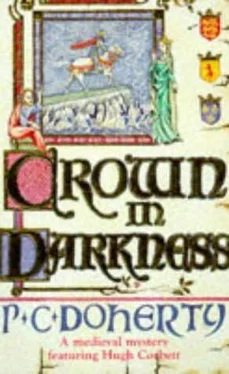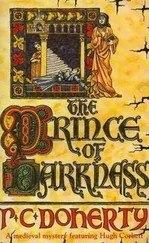Paul Doherty - Crown in Darkness
Здесь есть возможность читать онлайн «Paul Doherty - Crown in Darkness» весь текст электронной книги совершенно бесплатно (целиком полную версию без сокращений). В некоторых случаях можно слушать аудио, скачать через торрент в формате fb2 и присутствует краткое содержание. Жанр: Исторический детектив, на английском языке. Описание произведения, (предисловие) а так же отзывы посетителей доступны на портале библиотеки ЛибКат.
- Название:Crown in Darkness
- Автор:
- Жанр:
- Год:неизвестен
- ISBN:нет данных
- Рейтинг книги:4 / 5. Голосов: 1
-
Избранное:Добавить в избранное
- Отзывы:
-
Ваша оценка:
- 80
- 1
- 2
- 3
- 4
- 5
Crown in Darkness: краткое содержание, описание и аннотация
Предлагаем к чтению аннотацию, описание, краткое содержание или предисловие (зависит от того, что написал сам автор книги «Crown in Darkness»). Если вы не нашли необходимую информацию о книге — напишите в комментариях, мы постараемся отыскать её.
Crown in Darkness — читать онлайн бесплатно полную книгу (весь текст) целиком
Ниже представлен текст книги, разбитый по страницам. Система сохранения места последней прочитанной страницы, позволяет с удобством читать онлайн бесплатно книгу «Crown in Darkness», без необходимости каждый раз заново искать на чём Вы остановились. Поставьте закладку, и сможете в любой момент перейти на страницу, на которой закончили чтение.
Интервал:
Закладка:
The days passed, the monks celebrated the Feast of Midsummer, the beheading of St. John the Baptist. Corbett attended the solemn High Mass in the Abbey church watching the celebrants in their blood-red and gold robes moving like figures in a dream amidst the constant plumes of fragrant incense. The melodious chant of the monks intoning the psalm caught his ear, "Exsurge Domine, Exsurge et vindica causam meam" – "Arise, O Lord, arise, and judge my cause". Corbett closed his eyes and made his own prayer, sending it up into the void. Did God really care that the Lord's Anointed, blessed with royal oils on hands, feet and brow, the descendant of St. Margaret with the blood of Edward the Confessor in his veins, had been destroyed, brought low, murdered, tossed off the top of a cliff like a spent leaf blown in the wind? Corbett realised the dangers of what was happening, he was becoming obsessed with this matter as he did with anything he could not solve, rationalise, arrange in neat columns. He must make some progress, he thought, impose some order on the chaos which faced him or Burnell would not need to order his departure from Scotland. He would leave of his own accord and accept the consequences.
Therefore Corbett was relieved when, five days after his departure, the Prior's courier returned bearing an oral message. 'Thomas of Learmouth would only be too pleased to receive Hugh Corbett, clerk to the royal chancery of England.' 'Oh,' the Prior added almost as an afterthought, 'the courier also brought a personal message from Thomas.' 'What do you mean?' Corbett enquired. 'I have never met him and we know nothing of each other!' The Prior shrugged. 'It was nothing, just – "Tell Hugh that the pain Alice caused will disappear in time".' The Prior scrutinised Corbett's surprised face. 'What does it mean, Hugh? Who is Alice?' Corbett just shook his head and slowly walked away. He thought of Alice, beautiful Alice atte Bowe, the leader of a coven in London which had plotted against the King. He, Corbett, had destroyed the conspiracy and sent Alice to the fires at Smithfield. The very mention of her name awoke old pains; it was only much later on that he began to wonder how Thomas knew about Alice atte Bowe.
The next day, with a lay brother as a guide, Corbett and Ranulf left the abbey and journeyed south. The weather had changed; summer in its glorious profusion of colours had transformed the land that Corbett had travelled through a few weeks before. A blue sky with white lacy clouds, green, blue-dashed moors and grasslands, the hills strewn with wild flowers of many colours and different hues. It was wild countryside, steep hills and grassy plateaux, scarred and gashed by steel-grey rocks and rapid, frothing rivers which tumbled down the hillside. The lay brother, a simple soul, could name the flowers, the different varieties of heather and the birds which wheeled and soared with joy above them: he also taught Ranulf a song in broad Scots about the dangers of being a young girl alone on the moors with a young gallant. The song and their laughter were so infectious that Corbett joined in. They travelled for days and on the third entered the Lauderdale valley. The lay brother pointed below to the rounded ivy-covered tower, the centre of a small peel-castle nestling on the banks of the Lauder River. 'Thomas the Rhymer's castle,' he commented. 'Come. Let us go down.'
As they approached, Corbett realised the fortifications of Earlston were a square tower of pleasing proportions within a stockade or peel which Corbett had seen many times on his journeys into Scotland. It was surrounded by a moat spanned by a fragile bridge which they cantered across as quickly as possible into a dusty courtyard. This was small, containing a deep draw-well, stable, byre and storehouses, the latter no more than lean-to erections of timber plastered with clay. A groom ran forward to hold their horses while another ambled off to tell Sir Thomas of their arrival. Corbett dismounted and looked around, noting that the tower was not as vulnerable as would at first appear: narrow slits pierced the walls and a machicolation jutted out from the parapet just above the tower door from where defenders could hurl stones, or boiling oil, on any attackers.
Corbett was about to investigate further when he heard Ranulfs panic-struck voice. 'Master Corbett! Master Corbett! Come quickly! It's Sir Thomas!' Corbett turned to see a tall, lank, white-haired man in a black robe standing in front of their horses. Corbett strode across and the figure turned to greet him. Corbett stopped, shocked. 'Sir Thomas?' he queried. 'Yes, Hugh, it's Sir Thomas of Learmouth.' Corbett stared. The man's hair was white, as was his skin, but his eyes and lips were a bright pink, in fact the eyes were blue but pink-rimmed and, more strange, bereft of lashes. Corbett remembered he had heard of this type of man, an "Albus", an all-white man or albino. He tried to conceal his astonishment but Sir Thomas was almost laughing at him. 'Come, Hugh, say you are surprised. Most people are. I am odd? Different?' His voice was clear, low and pleasing.
Corbett grinned back; a Welshman had once told him that each person has an aura' about him, be it good or evil, which goes out to other people. If this was so then Sir Thomas exuded friendship and goodwill. 'What matter the face or head,' he quoted, 'it is the heart which counts!' 'You like poetry, Master Corbett?' 'I enjoy it when I can.' Good,' Sir Thomas replied. 'We knew you were coming,' he added for effect, and laughed at Ranulf s gaping face. 'No gift of prophecy,' he jabbed a finger upwards. 'I saw you from the top of the tower. Come. Food is ready!' They entered the cool, dark tower, across stone-vaulted floors and climbed up a narrow twisting staircase into the hall. A sombre stone chamber, its walls were adorned with green velvet drapes while a polished table with benches on either side stood in the middle of the rush-strewn floor. At the far end was a narrow door which, Thomas announced, led into the kitchen. A small, dark, smiling woman appeared through it. Thomas put his arm round her shoulders and introduced his wife Bethoe, who gently murmured her welcome. She bade them sit and brought a tray of wine, cups, and a bowl of sugared wafers. They ate, talking about the journey and the gossip of the court until Thomas asked Bethoe to show Ranulf and the lay brother to their quarters. Once they were gone, he turned to Corbett and stared fixedly with his terrible, haunting eyes. 'Well, Master Corbett? What does an English clerk want with me?' Corbett set his goblet down before replying. 'His Grace, Alexander III. He died, as you know, from a fall on Kinghorn Ness. You prophesied his death.' Thomas nodded. 'How did you know?' Corbett asked. 'I saw it,' Thomas replied, touching his forehead lightly with his fingers. 'I saw pictures. Images, when I looked into the water.' 'What water?' Corbett snapped. 'The small, dark people,' Thomas smiled. 'Some people call them fairies, goblins. The Romans called them the "Picti" or Picts, the "Painted People".' He grinned, his teeth white and even. 'The stories are true. I lived with them, not for nine years, but for a while. They are outcasts. So am I, and we share the same gift of glimpsing the future.'
Corbett sighed and shook his head in disbelief. Thomas turned and pointed to a fly crawling on the end of the table. 'Look at the fly; all he can feel, all he can see is the table. Can he be blamed for believing that the only things which exist are himself and the table? So it is with us, Master Corbett. We only believe what we can see and touch!' 'I have heard a similar philosophy enunciated by the schoolmen,' Corbett rejoined, 'but, seeing into the future?' Thomas rose and beckoned Corbett over to one of the arrow-slit windows and pointed down to the winding River Lauder. 'Look, Master Corbett, from here we can see all the river in our view, but if we were in a boat on that river, what would we see? A little in front, a little to the rear and the banks on either side. So it is with time. It is simply a matter of where you stand!'
Читать дальшеИнтервал:
Закладка:
Похожие книги на «Crown in Darkness»
Представляем Вашему вниманию похожие книги на «Crown in Darkness» списком для выбора. Мы отобрали схожую по названию и смыслу литературу в надежде предоставить читателям больше вариантов отыскать новые, интересные, ещё непрочитанные произведения.
Обсуждение, отзывы о книге «Crown in Darkness» и просто собственные мнения читателей. Оставьте ваши комментарии, напишите, что Вы думаете о произведении, его смысле или главных героях. Укажите что конкретно понравилось, а что нет, и почему Вы так считаете.












